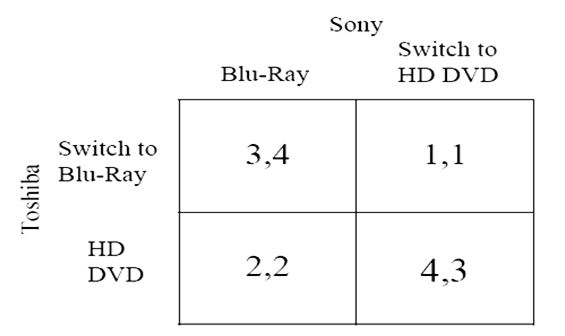What is (are) the Nash equilibrium (equilibria) in the game?
In 2006, there were a number of media reports about the next generation of DVD players, which produce much clearer picture and sound than that produced by current machines. However, there are two competing formats, Blu-ray (Sony) and HD DVD (Toshiba). Both are affiliated with certain movie studios, which have agreed to release their movies in one or the other of the new formats. This creates a problem for the producers of this new technology—they all want their own version to win out, but by competing they make it entirely likely that most consumers will sit back and wait until (a) one of the formats is a clear winner or (b) a newer, even better, method of supplying movies is developed by someone else. If the latter happens, both Sony and Toshiba lose out.
Imagine that both companies have developed a new product, but with different formats. If one of the companies would be willing to switch quickly (assume that copyright laws would allow it to produce something similar), that company would lose some time and market share but be able to get into the market. Consumers would be more willing to buy the new technology, and both companies would make more money. If neither company is willing to coordinate with the other, they end up in a war of attrition, with fewer customers. This is shown in the game below.

A. Switch to Blu-Ray; Blu-Ray and HD DVD; Switch to HD DVD
B. Switch to Blu-Ray; Blu-Ray
C. HD DVD; Blu-Ray
D. HD DVD; Switch to HD DVD
A. Switch to Blu-Ray; Blu-Ray and HD DVD; Switch to HD DVD
You might also like to view...
The Internet began as a(n) __________
a. bet between two math professors b. outgrowth of IBM's interest in computers c. military project in the 1960s d. project by Google
How do African American perceptions of the criminal justice system compare with those of whites?
a. Most whites and African Americans believe the criminal justice system is fundamentally unfair. b. When the victim is black, whites and African Americas attribute police brutality to individual malfeasance by officers, not as racism. c. Whites see the disproportionate percentages of African Americans in prison as discrimination, whereas African Americans see it as a product of greater criminality among African Americans. d. Most whites believe the criminal justice system is fundamentally fair; most African Americans do not.